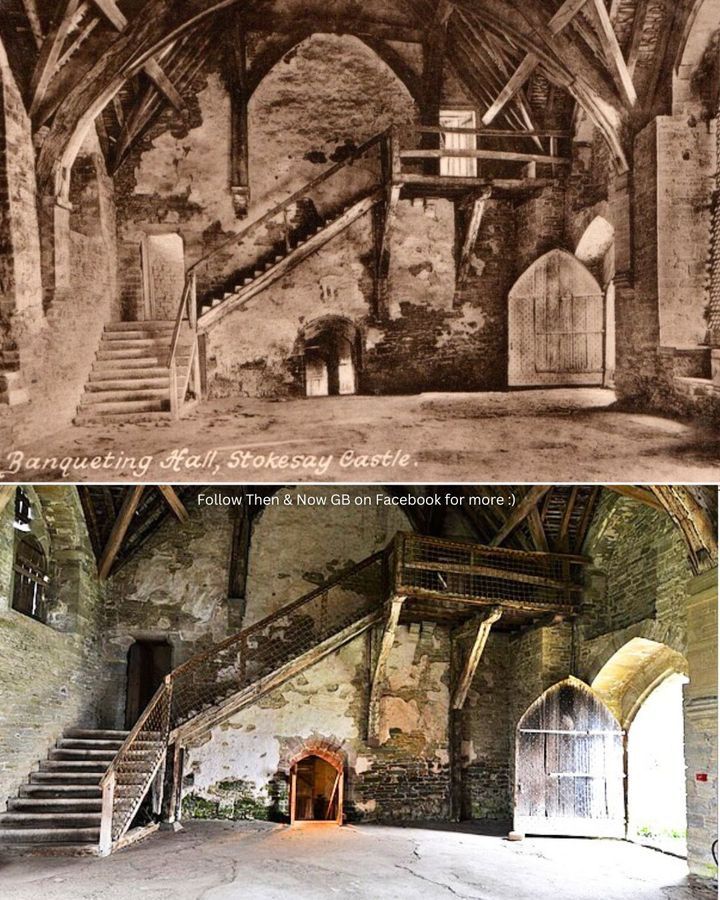 For more than 700 years, the Great Hall of Stokesay Castle had stood in quiet defiance of time. Its towering cruck roof, shuttered gable windows, and ancient oak beams had borne witness to feasts, battles, whispered secrets, and fleeting romances. It was a place where history lingered in the air, where the past felt as tangible as the stones beneath one’s feet.
For more than 700 years, the Great Hall of Stokesay Castle had stood in quiet defiance of time. Its towering cruck roof, shuttered gable windows, and ancient oak beams had borne witness to feasts, battles, whispered secrets, and fleeting romances. It was a place where history lingered in the air, where the past felt as tangible as the stones beneath one’s feet.
But on a cold autumn evening in 1352, the Great Hall played host to a gathering unlike any before it.
Lord Edmund de Stokesay, the aging master of the castle, had summoned his most trusted knights and advisors. News had arrived that a band of outlaws—mercenaries who had once fought in the Hundred Years’ War—were raiding nearby villages. Their leader, a shadowy figure known only as The Black Raven, had set his sights on Stokesay itself.
Edmund, though weary from years of rule, was not a man to yield easily. He stood at the head of the long oak table, his hand resting on the pommel of his sword. The flickering torchlight cast long shadows across the faces of his men.
“We have stood for centuries,” he declared, his voice firm despite the tremor of age. “And we shall not fall to a band of thieves.”
His steward, a shrewd man named Robert, leaned forward. “My lord, the Great Hall is strong, but the outer defenses are thin. If they breach the gates—”
“Then we fight within these walls,” Edmund interrupted. His gaze swept over the hall, over the tapestries that had hung for generations, the high beams that had sheltered his ancestors. “This place has endured war and peace alike. It will endure this.”
The men nodded, their resolve hardening. Plans were made, defenses reinforced. That night, as the castle lay in uneasy silence, the Great Hall stood as it always had—unchanging, eternal, waiting.
The attack came at dawn.
The Black Raven and his men stormed the outer gate, but Edmund’s forces were ready. Arrows rained from the towers, and swords clashed in the courtyard. As the battle raged outside, Edmund himself stood in the Great Hall, sword drawn, prepared to defend the very heart of his home.
The doors burst open, and the Black Raven strode in, his dark cloak billowing. He was no ordinary brigand—his armor, though worn, spoke of noble origins. His voice, when he spoke, was calm, measured.
“You fight for stone and wood, Lord Stokesay,” he said. “But is it worth dying for?”
Edmund’s grip on his sword tightened. “This hall has stood for centuries. It will stand long after both of us are dust.”
The two men clashed beneath the ancient beams, steel ringing against steel. But Edmund, though skilled, was old. A well-placed strike sent him to his knees. The Black Raven raised his sword for the final blow—
And then hesitated.
He glanced around the Great Hall, at its untouched grandeur, at the echoes of history woven into its walls. Something in him wavered.
“Enough blood has been spilled today,” he murmured, lowering his blade. “Your castle stands, my lord. For now.”
With that, he turned and strode away, calling off his men.
As the Black Raven disappeared into the morning mist, Edmund exhaled, his grip loosening on his sword. He did not know why the outlaw had spared him, but one thing was certain—Stokesay Castle, and its Great Hall, had withstood yet another test of time.
And for centuries more, it would continue to stand, unchanged, eternal, a silent witness to history’s endless march.
